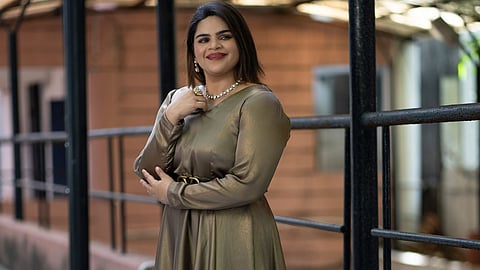From comedy to courtroom: Vidyullekha Raman’s career-defining role in The Verdict
When we dialled up actress and comedienne Vidyullekha Raman to talk to her about her latest court drama, The Verdict, she was wrapped up in the dubbing for a Telugu film. “It’s a bilingual called Meghalu Cheppina Prema Katha that’s also being dubbed in Tamil as Meghana Sonna Kadhal Kadhai. The film also features Radikaa Sarathkumar. So, they arranged the dubbing in Chennai itself after sending the footage here,” she begins. The actress talks about the film, breaking the stereotype with The Verdict, her journey in the industry, and more. Excerpts…
Vidyulekha Raman on her bold transformation in The Verdict
Tell us about your role in The Verdict.
It is a film I’m truly proud to be a part of. Looking back at all the roles I’ve done, this one stands out. I’ve always been grateful for the love I received through my comedy roles. They’ve brought me closer to the audience. But in The Verdict, I was able to explore a deeper, more emotional character—not the typical comedic persona people associate me with. Director Krishna Sankar initially asked if I’d be able to pull it off, and I said, “Of course!” I’ve been waiting for a role like this. I was a theatre artiste for 10 years before entering films and had done all kinds of characters. But in cinema, I was stereotyped quickly.
In The Verdict, I play one of the 12 jury members in a Texas courtroom, involved in a high-stakes murder trial. My character is an Indian-American lawyer, and the twist is that I’m the only juror who says “guilty” while everyone else says “not guilty.” During the shoot, I gave such a convincing monologue that the other actors accidentally changed their lines to “guilty.” The director had to cut and remind them, “No, you’re supposed to say ‘not guilty’!”
It was such a powerful scene. Plus, all my co-actors were seasoned American artistes from films and TV. And what I loved was how much importance was given to the female characters—not just mine but also Suhasini (Mani Ratnam) ma’am’s, Varalaxmi’s (Sarathkumar), Shruti’s (Hariharan). Often, women get sidelined in films, but The Verdict treats all characters with depth.
It’s been over a decade since your debut. How has your journey evolved?
My journey has been filled with gratitude. Not everyone can say they’ve worked with big names like Ajith sir, Vijay sir, Dhanush, Sivakarthikeyan, Mahesh Babu sir, Jr. NTR, Ram Charan, and Allu Arjun. But deep down, I always wanted to be the next big thing in comedy. I look up to icons like Aachi Manorama, Kovai Sarala—they were given great opportunities. Today, we have to fight for roles. Especially after the pandemic, writing has changed. Films were reduced to four-five characters, and female comedians got pushed out.
Though stand-up comedy scene has a lot of women artistes, we cannot say the same for cinema. Why is that so?
It’s not a lack of interest—it’s a lack of opportunity. I’ve watched so many Tamil films recently and haven’t seen a single character I felt I could have played. Earlier, I was paired with Santhanam, which was a great combo, but then female comedy roles just disappeared.
Do you think Tamil cinema is moving away from body-shaming jokes?
Yes, thankfully, some new-age directors are more sensitive now. In the past, I’ve been the butt of body-shaming jokes in many films. People ask if I was okay with it—I wasn’t. But when you’re trying to establish yourself, you don’t always have the power to say no. Still, I knew those jokes made people laugh, and the films became hits. Today, I have the confidence to say no to such humour. I believe the audience has evolved too. I remind directors that there are people who look like me watching these films. Jokes can hurt. So now I push for better, smarter writing.
Out of all your roles, which one was the most challenging?
The Verdict, without a doubt! After doing comedy for 10 years, to suddenly shift to a serious courtroom juror character—who’s taken seriously—was a major shift. I had to convince myself and the audience. I even had to speak with a slight American accent. There was a lot of self-doubt, but my director and co-actors reassured me that I had done well. The character has depth, and I also work for Varalaxmi’s character in the film, so there are multiple layers.
If not comedy, what kind of roles would you like to do?
Roles like the one in The Verdict—not necessarily ultra-serious but impactful! I want characters that challenge me emotionally and physically. I’m an actor, not just a comedienne.
Your Telugu has improved a lot...
I made my debut in Telugu (Yeto Vellipoyindhi Manasu, the remake of Neethane En Ponvasantham) in 2012. If I hadn’t learned the language by now, I’d have done the industry a disservice. When I started, I didn’t even know the basics of Telugu. But as someone who does comedy and improvises on the spot, I had to get a solid grip on the language. I took it up as a mission. My staff—assistants, makeup, hair—were all from Andhra. So, by default, I had to speak to them in Telugu. Even if it was broken, I kept asking them to correct me. Eventually, I got good enough to write my own dialogues.
You’ve done Tamil, Telugu, Kannada... Malayalam next?
Malayalam is the only feather missing from my South Indian cap. I love Malayalam cinema—I watch everything on OTT and in theatres. I hope to debut in it soon. Also, this year, I’m stepping into Hindi cinema with a biopic on Subhash Chandra Bose. Shreyas Talpade plays Bose, and I’m part of the ensemble. It’s been shot in London and Mumbai.
Any other upcoming projects?
Meghalu Cheppina Prema Katha is releasing soon in Telugu and Tamil. I’m also in talks for two Tamil films.
sangeetha.p@newindianexpress.com
X-@psangeetha2112

